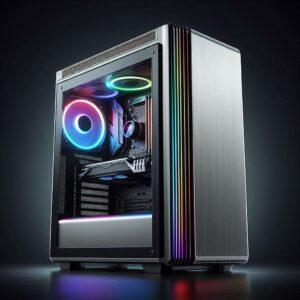
When building a PC, choosing the right case is more important than you might think. Your PC case not only affects the look of your setup but also impacts airflow, component compatibility, and future upgrades. Whether you’re looking for a spacious full-tower or a compact mini-ITX case, understanding the different sizes and what they offer can help you make an informed decision. Let’s dive into the world of PC case sizes and find the right one for your build.
Overview of PC Case Sizes and Form Factors
PC cases come in various sizes, each designed to accommodate different needs and hardware configurations. The most common sizes include:
- Full-Tower Cases: These are the largest, offering plenty of space for high-end components, multiple graphics cards, and extensive cooling solutions.
- Mid-Tower Cases: The most popular size, striking a balance between space and compactness. They fit most standard builds and offer room for expansion.
- Mini-Tower and Small Form Factor (SFF) Cases: These are smaller, designed for more portable or space-saving builds.
Each case size corresponds to a motherboard form factor, such as ATX, Micro-ATX, or Mini-ITX, which determines the number of components you can install.
Full-Tower and Mid-Tower Cases: Room for Expansion
If you’re planning a high-performance build or want future-proofing options, full-tower and mid-tower cases are ideal.
- Full-Tower Cases:
Full-tower cases can fit the largest motherboards (Extended ATX or E-ATX) and offer ample space for custom water-cooling loops, multiple GPUs, and plenty of storage drives. They also provide excellent airflow due to their spacious interiors. However, they are bulky and take up a lot of space.
ample space for custom water-cooling loops, multiple GPUs, and plenty of storage drives. They also provide excellent airflow due to their spacious interiors. However, they are bulky and take up a lot of space. - Mid-Tower Cases:
Mid-tower cases are the go-to choice for most builders. They support standard ATX motherboards and offer enough room for most GPUs and cooling solutions. These cases are more manageable in size while still offering good airflow and cable management options.
Common Issues:
One downside of larger cases is the potential for excess space if you’re not using high-end hardware. Make sure to plan your build accordingly to avoid wasted space.
Compact Cases: Small Form Factor (SFF) and Mini-ITX Builds
For those who value a minimalist aesthetic or need a portable setup, compact cases are a great choice.
- Mini-ITX Cases:
These cases are designed for Mini-ITX motherboards, which are the smallest form factor. They’re perfect for portable gaming PCs or home theater setups. However, building in a Mini-ITX case can be challenging due to limited space for components and cooling. - Small Form Factor (SFF) Cases:
SFF cases offer a bit more flexibility than Mini-ITX cases while still maintaining a compact footprint. They often support Micro-ATX motherboards and can accommodate mid-range GPUs.
compact footprint. They often support Micro-ATX motherboards and can accommodate mid-range GPUs.
Common Issues:
Compact cases often have restricted airflow and limited space for upgrades. You may need to use low-profile components and plan your cooling setup carefully to avoid overheating.
Choosing the Right Case for Your Build
Selecting the right case depends on several factors, including your build goals, budget, and available space. Here are some tips to help you choose:
- Define Your Needs: Are you building a high-performance gaming rig or a simple home office PC? High-end builds may benefit from larger cases, while compact cases are great for minimalist setups.
- Check Compatibility: Ensure that the case supports your chosen motherboard, GPU, and cooling solutions.
- Consider Airflow and Cooling: Cases with good airflow and space for fans or liquid cooling will keep your components running efficiently.
- Think About Future Upgrades: If you plan to upgrade components later, choose a case with extra room for expansion.
- Aesthetics and Personalization: Cases come in various designs, from sleek and minimalist to RGB-lit and flashy. Pick one that suits your style.
Conclusion
Choosing the right PC case is about more than just aesthetics—it’s about creating a functional, efficient, and future-proof build. By understanding the different sizes and what they offer, you can find a case that fits your needs and enhances your PC-building experience. Whether you go for a spacious full-tower or a sleek mini-ITX case, the right choice will set the foundation for a system that’s not only powerful but also tailored to you. Happy building! 🚀

 ample space for custom water-cooling loops, multiple GPUs, and plenty of storage drives. They also provide excellent airflow due to their spacious interiors. However, they are bulky and take up a lot of space.
ample space for custom water-cooling loops, multiple GPUs, and plenty of storage drives. They also provide excellent airflow due to their spacious interiors. However, they are bulky and take up a lot of space. compact footprint. They often support Micro-ATX motherboards and can accommodate mid-range GPUs.
compact footprint. They often support Micro-ATX motherboards and can accommodate mid-range GPUs.